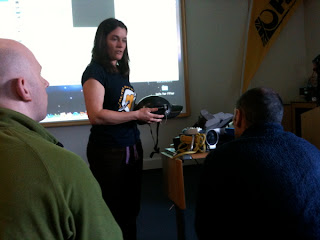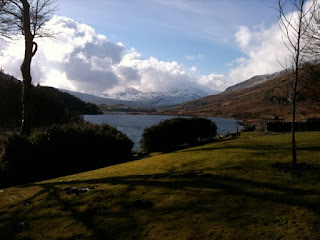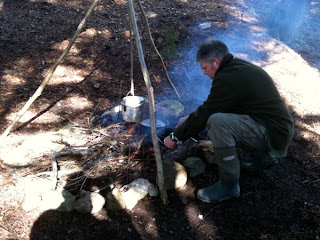Equality - It provides a common and yet novel experience where all participants are equal in their knowledge about the tasks and projects that will confront them. A unique set of projects and situations requires people to draw upon genuine team process skills as opposed to just functional ones.
Developing relationships quickly - Participants are interacting in close proximity whilst working on new and unfamiliar challenges. The communication, collaboration and effort that are required to meet these challenges develops relationships quickly. People may get to know each other better in a single day within this environment than over an entire year of normal working conditions.
Disequilibrium - The unfamiliarity of the challenges and problems places people in a state of disequilibrium or disorder. They can not easily stand behind their normal status, roles and defences. Prior experience isn't as relevant in this environment. This can allow emphasis to be placed upon both task and process related themes as the group has to organise itself around the challenge.
Projective technique - In organising the instability or disequilibrium, the group projects their problem-solving skills, project management ability, and leadership style onto the experience. The experience provides a unique opportunity to catch participants doing what they typically do, inspite of knowing otherwise. The learning arising from this is profound and revealing. The window or mirror into their process provides unlimited information or data to shape their team based learning.
Decreased time cycle - The space between the project or challenge and the outcomes are compressed, so the consequences of organisational decisions can be easily examined and improved. Typically in an organisation , there is more of a time lag and more variables to consider, so any review or learning risks being diluted or delayed.
Meta Learning - In the experiential 'learning laboratory", as the projections and simulations shed light on the teams process, the group is asked to step back and evaluate their performance. The review is about themselves, their leadership, problem solving skills, teamwork, communication and managing change. The intensity with which these issues can arise, and then be discussed in this environment, is superior to that which normally occurs within the organisation.
Chaos and Crisis in a Safe Environment - Teams are able to experience chaos, disorder, crisis and changing requirements for success in a safe environment where the consequences for failure are limited. The team can develop strategies and best practices for managing these issues both in this environment and back at work.
Kinaesthetic Imprint - Experiential learning is an anchor for cognitive material. Participants have a kinaesthetic imprint or whole body learning of cognitive principles because the learning is graphic as it involves physical, mental and behavioural dimensions.
Common language / company mythology - The experience provides a common language, experience and story, which can be related to the work environment. The experience can provide a short cut in communicating a shared vision very quickly. The experience is stored in a way that is able to permit participants to see themselves and their colleagues in a new light. The experience (and stories attached thereto) can serve as a catalyst for continuing the theme in the organisation.
Encourage Risk Taking - The experience allows participants to take new risks, try on new roles and make mistakes with no danger or cost. Risks are naturally perceived rather than actual. Each person taking a risk pushes others to take on something outside of their comfort zone. There are always individuals who shine in this environment - whose leadership ability hasn't been noticed at work.
Diversity of Strengths - The team challenges and activities are designed to include a variety of elements that will challenge a range of team role skills. In other words input from all team members will be required to produce outcomes from projects specifically designed not to suit just one team role style or behaviour. One person cannot possibly succeed alone and so the interdependence of the team is highlighted along with the importance of diversity within the team.
Fun - This environment provides a highly enjoyable way to learn about and develop team and management process skills. Fun is a powerful aspect of effective learning with participants becoming more open to the experience and creative whilst participating in it. Sabre events and programmes will always place great importance on having fun. For this we don't apologise.
These 12 points are drawn from the Experiential Learning Research of corporate psychologists Dr John Luckner and Reldan Nadler . Their book 'Processing The Experience: Strategies to Enhance and Generalise Learning. Kendall / Hunt Pubishing (1997) makes for worthwhile reading.











